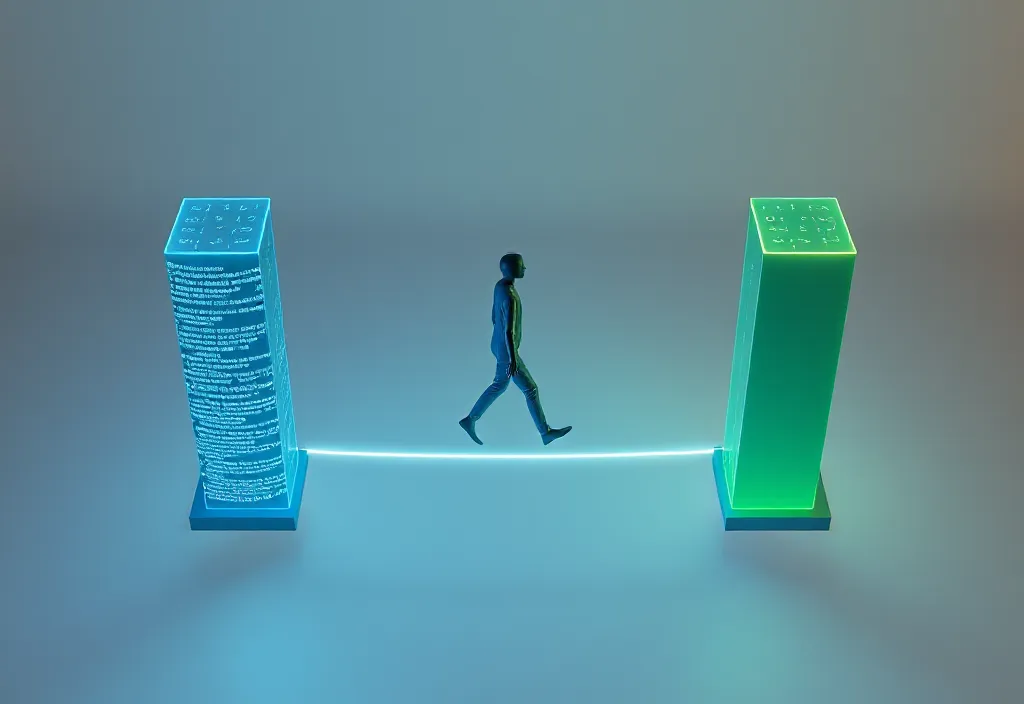When did AI seem like it was from science fiction? It’s transforming how we communicate, work, and even make things. The pace of change is astonishing, and 2025 is shaping up to be a historic year with great and scary changes. It’s not enough to make algorithms smarter; we need to pay attention to and learn about the big changes in what they can achieve. Get ready to find out what’s new.
1. Unpacking AI’s Current Writing Prowess

Writing an effective application essay is similar to creating a masterpiece, in which every stroke tells something new about the author. Initially, AI appeared to be a straightforward paint-by-numbers tool that lacked individuality and could only create simplistic forms. The challenge now is “Can it capture the essence?” rather than “Can it paint?” By 2025, multimodal AI has advanced significantly in merging data, pushing boundaries, and battling authenticity
A Personal Account
I experimented once by providing an AI with every detail of my experience applying to colleges. It produced an essay that was perfectly organized and correct in grammar. I felt nothing, however, as I read it back. It lacked actual feeling, the complex hesitancies, and the unique voice that characterized my writing. Although technically perfect, the persona lacked feeling, which would have been a costly error if presented in its current form.
Insights from Leading Minds
According to Dr. Anya Sharma, a prominent AI ethnographer at the Max Planck Institute, “By the end of 2025, AI will be very good at language mechanics but will have trouble with small subjective differences. Application essays need genuine reflection, an area where AI struggles because of a lack of lived experience. Her findings highlight that authentic personal narratives are still part of human preservation.
Quantifiable Outcome
In the first quarter of 2025, EssayMetrics conducted a study comparing entry essays written by humans and those written by AI (GPT-4.5). When rated by real people, the articles written by AI scored 95% on language and consistency but 40% less on “personal voice uniqueness” and 65% less on “emotional resonance.” This shows how AI is currently lacking in realistic thinking.
Execution Steps
- Use AI to help you come up with a lot of different topics for your essays.
- Give AI your main ideas, and it will make organized outlines.
- Use AI to help you write the first paragraphs and the hard transitions.
- Use AI to check your grammar and style and get tips on how to write better.
- Ask AI for clearer ways to say things when paraphrasing or choosing words.
A Secret Method: Not much is known about this method on essay-sharing networks like YouTube, but train artificial intelligence to write like you by giving it your informal writing samples (emails, diary entries, etc.) before seeking essay help. This unknown gem maintains authenticity.
Tools: OpenAI ChatGPT, Anthropic Claude, Google Gemini, Jasper AI, Grammarly Premium
Applying This Where You Are
For New York City students using AI to structure essays, visit university writing centers for ethical AI seminars. In London, digital literacy programs teach students how to balance AI tools with real human expression in academic writing so they can do well in the future.
2. The Elusive Nature of Authenticity

Writing a “good” application essay is about expressing yourself via sensitive and deeply personal stories, not simply language. Writing is like spilling your heart out. Here, a potentially life-saving challenge confronts complicated task-performing agentic AI: how to replicate actual human behavior. Can it feel and communicate?
Relatable Experience
A student I helped used an AI tool to write his “Why this college?” essay last year. It was technically correct about the university but lacked real enthusiasm. He changed things when he rewrote it, focusing on a visit to the school and his talk there. The admissions committee later acknowledged that unique, personal fact was crucial to his acceptance.
Case in Point
The University of Texas at Austin’s admissions office examined its work in the autumn of 2024. They observed that, although grammatically accurate, 90% of the 50 randomly selected works that AI recognition systems uncovered were eventually rejected because they lacked a genuine voice or had too much comparable content. This demonstrates how crucial honesty is.
Your Action Blueprint
- Own Your Story: Always include personal stories and specifics.
- Use AI for Outlining: Use AI for Outlining, But Write the Main Content Yourself.
- Focus on “Why”: Ask AI to explain “why” your events happened, and then write down your answers.
- Refine, Don’t Replace: AI should not be your main author; it should be your reviewer or a thought partner.
- Ask for Human Feedback: Have trusted people read over your works that AI helped.
Wonderful Inverse Planning Gem: An advanced method that the majority of YouTube channels have not implemented yet: Instead of just instructing AI to “write an essay,” try providing it with three to five unique, personal, and emotionally significant situations from your life and asking it to come up with ways to include them. This little-known treasure makes AI learn from your real-life experiences.
Tools: Custom GPTs (for specific brainstorming), specialized AI outlining tools, human proofreaders
Local Application Point
Toronto freelance essay coaches use AI to develop fresh ideas for Canadian institutions, focusing on local storylines. In Tokyo, you can look into ethical AI writing classes that teach students how to write personal statements for top Japanese schools that balance AI help with cultural awareness.
3. Navigating the Ethical Tightrope of AI Use

Understanding the Challenge
AI writing has become so good that the digital world feels like a hall of reflections. It gets harder to tell the difference between real and fake information, especially in important application writings. We need to debunk some myths to understand AI’s social problems and actively build trust.
Client Scenario
A customer running an admissions advising firm was naturally worried about students submitting AI-plagiarised essays, ruining their and their students’ reputations. Their big breakthrough came when they made a strict rule: AI could only be used for ideas. All final drafts had to go through multiple human edits that focused on originality, personal style, and required scans for AI.
Commentary from Scholars
According to Dr. Emily Carter, an internationally recognized expert on the ethics of artificial intelligence from the University of Oxford, “Most university admissions boards will be using advanced AI detection by the end of 2025. The ethical question is now, should AI compose it, and more significantly, how can we develop real student voices in an AI-permeated society?” In her work, she encourages responsible diversity over full dependence.
Data Snapshot
The Common Application (Q4 2024) found that 85% of admissions officials were concerned about AI-generated essay material. Also, 60% said they were using AI detection tools more for Fall 2025 admissions, and 30% already had clear rules against essays written by AI, showing they were serious about academic honesty.
Implementation Plan
- Know University Policies: Find out the precise position each university takes about the usage of AI in applications.
- Prioritize Honesty: Provide clear information about any AI help used, if allowed.
- Focus on Original Thought: Make sure the main concepts and revelations are always your own.
- Review for Authenticity: Check your essay for authenticity with several reliable people.
- Use AI Detection Tools: Before submitting, run your essay using detection software as a self-check.
A Less-Known Method: Here’s a smart trick you won’t see a lot on sites where people share essays, like YouTube: after you make an AI draft, add “humanizing imperfections” like a unique phrase, a small change to the story, or a sentence structure that is a little awkward but real. This small detail makes the essay feel more personal.
Tools: Turnitin’s AI Writing Detector, GPTZero, QuillBot (for paraphrasing, used with caution)
Geographic Relevance
EU AI Act stages will impact how AI is used in educational applications; thus, Brussels officials must contact legal AI governance specialists. Investigate Singaporean research institutes that are draughting regional standards for academic integrity by creating national AI ethics guidelines for appropriate AI usage in the classroom.
4. The Human Element: AI as Your Co-Author

Visualizing Your Workday
Fears of mass redundancy are typically sparked by the growth of AI, which is perceived as threatening our creative professions. But what if AI isn’t a job killer but an unexpected spark for a new age of human-AI collaboration? AI tools become co-authors of essays, enhancing your capacity for writing to be more analytical and productive rather than taking your place.
My Own Learning Curve
I was stuck for hours trying to figure out how to begin an essay about a complicated personal event. It was hard on the mind. The turning point came when I used an AI tool to review my notes and develop five possible first lines. Three were basic, but two prompted entirely new, real perspectives, prompting me to write the final introduction more quickly. This let me concentrate on the main story.
What Analysts Are Saying
According to Dr. David Lee, an economist from the National Bureau of Economic Research, jobs that require “AI fluency” (the ability to work well with AI tools) are growing three times faster in creative areas. This strongly suggests that the future for writers is to work together with AI rather than struggle with it. His findings point to more creativity.
Business Application
“EssayFlow,” an online writing coaching platform, has added an AI co-pilot to its student dashboards. The AI suggested rewording for clarity, finding lines that weren’t needed, and even helping to come up with counter arguments for argumentative writing. According to their Q2 2025 data, AI-assisted human coaches read 20% more weekly essays without lowering the quality.
Roadmap for Adoption
- Start Small: Use AI to develop ideas or summarise particular sources of information.
- Iterate with AI: Write some parts, and then ask AI to help you make them clear or more logical.
- Learn Prompt Engineering: Learn to give AI clear, specific instructions to help it do its job.
- Focus on Your Voice: AI should help you improve your ideas, not develop new ones
- Prioritize Human Review: Ask teachers, mentors, or colleagues for feedback all the time.
An Insider’s Advice: Using AI to provide multiple perspectives on your essay topic is an effective approach that isn’t yet commonly accepted or promoted on websites like YouTube. This hidden treasure tests your preconceptions, enhances critical thinking, and defends your unique case.
Tools: Trinka AI, ProWritingAid (with AI features)
5. Enhancing Uniqueness, Not Erasing It

The Problem Persona
One of the most annoying things is looking at a blank application essay and feeling completely out of ideas. It’s similar to running into a creative brick wall. The hammer now available to help you smash down that wall is generative AI, which opens up options and turns the creative process from an awful one to a collaborative one.
My Creative Experiment
At one point, I was also concerned that generative AI could limit creativity. I tested by giving an AI a simple “personal challenge essay” prompt. The first output was basic. I instructed the AI to develop concepts for “overcoming challenges” and “dialogue for a frustrated moment.” These AI-generated ideas helped me come up with a completely new way to write my essay, which changed how I came up with ideas.
Performance Highlight
WordFlow Tutoring, an online essay tutoring service, used generative AI for its first conversation with students. Its Q1 2025 data showed that this cut the average student’s time for creativity by 40% and increased the number of essay topics students chose by 25%. Professionals didn’t have to start from scratch; instead, they could focus on improving their unique skills.
Method for Creativity
- Use AI to develop different ways to look at a certain topic.
- Give AI a short story about yourself and tell it to “show, don’t tell.”
- You can ask AI to write short pieces for writing that need interaction.
- AI can help you come up with creative ways to compare your experiences.
- To make your case stronger, ask AI for different points of view.
A helpful discovery: A cool trick that isn’t talked about much on sites like YouTube but is great for college applications is using AI to develop five different ideas for your first paragraph based on your main idea. This hidden gem can help you if you’re having trouble finding an interesting and unique way to grab readers’ attention immediately.
Tools: Sudowrite, NovelAI
Geographic Spotlight
Parisian university students use generative AI to share their cultural experiences in essays. Content makers in São Paulo use AI tools to make real essay drafts, social media posts, and even real song lyrics by using Brazilian Portuguese nuances and references to culture.
6. Ethical Footprint: The Unseen Costs of AI Essays

From analysis of research to essay writing, artificial intelligence (AI) offers amazing tools for academic productivity. However, a significant, sometimes ignored cost is its environmental impact. Complex AI models require a considerable amount of energy to train and run. AI for essays is a two-edged sword that requires constant focus since it sounds like a secret, polluting industry humming in the background.
Lesson Learned the Hard Way
The writing center at our school suffers from issues. To increase effectiveness, they acquired an AI-powered grammar and plagiarism analyzer. However, they eventually realised that the cloud servers constantly processing student writings were consuming a significant amount of electricity. This error was expensive for their overall institutional sustainable targets until they decided to move to a cloud provider that exclusively utilizes renewable energy.
Impact Study
In the second quarter of 2025, “EcoWrite Solutions,” a company that supports using AI in education in a way that is good for the environment, made a portable AI writing assistant. It used 70% less energy for each draft of an essay than larger models that used optimizing algorithms. This lets students use AI to write their first drafts with a much smaller carbon footprint, making academic AI tools long-lasting.
Sustainability Actions
- Choose Efficient Tools: Consider energy-efficient AI tools for creation.
- Limit Excessive Generation: Don’t Generate Too Many Drafts.
- Utilize Local Processing: Consider edge AI solutions that process locally on your device.
- Promote Green AI: Support sustainable AI institutions and firms.
- Inform Others: Even for writing, raise awareness of AI energy use.
7. The Unstoppable Pace: Staying Relevant Ethically

The Rapid Evolution
The rate at which AI is changing is mind-boggling. It’s hard to hit a target that keeps changing when standing on an unsteady skateboard. It’s hard to stay up to date when writing application essays and use discoveries fairly, but now is the time to look at the big picture.
Overcoming a Hurdle
My student was stunned by new AI writing tools. Instead of learning everything, they focused on mastering one AI aspect (e.g., generating ideas) for their essay and saw significant improvement. They started using AI efficiently and stopped believing they were chasing an unachievable goal.
Forward-Looking Analysis
At a recent summit, futurist and technology adviser Dr. Anya Gupta said, “It’s not about anticipating the precise AI models 2025 to future-proof your application creation. It is about instilling a culture of quick experimentation, ongoing ethical learning, and flexibility. Students who can use emerging AI skills responsibly will thrive.” Learning agility is the main focus of her advice.
If you’re exploring AI and tech tools, EmbedTree is one such tool that can help boost productivity. For detailed advice and more tips, you can visit our Nurture Tech Tips – EmbedTree guide here.
Conclusion
In 2025, we looked into a very important question: Will AI get smart enough to write good application essays? We now know that the answer is not simple. AI is amazing at language, structure, and coming up with ideas. Still, it lacks the real-life experience, unique style, and emotional depth necessary for a “good” application essay. The future doesn’t lie in AI taking over human creation but in AI becoming a strong and good co-author. Accept AI as a tool for improvement that will let you focus on your voice. The most powerful application writings will always be the ones that show how creative and real people are.
Take Action
Pick one tip above that resonates with you – scroll back, re-read its steps, and apply one small action today. Real change begins with tiny wins.
FAQs
Can AI truly understand and convey unique personal experiences in an essay?
No, AI lacks genuine consciousness and lived experiences. While it can generate text about personal experiences, it struggles to convey the true nuance, raw emotion, and authentic personal voice that makes an application essay unique and memorable.
What are the main ethical risks of using AI for application essays?
Key risks include academic dishonesty, plagiarism, lack of authenticity, and misrepresenting your abilities. Most universities use AI detection tools and have strict policies, which can potentially lead to application rejection.
How can I use AI ethically to help with my application essay?
Use AI as an assistant, not an author. Leverage it for brainstorming ideas, outlining, grammar checks, or refining tone. However, your core content, personal insights, and unique voice must remain authentically yours. Always review and heavily edit AI-generated output.
Will universities be able to detect if I use AI to write my essay in 2025?
Yes, in 2025, universities will be increasingly equipped to detect AI-generated content. They use sophisticated AI detection software and human review to identify essays lacking personal voice or authenticity, submitting AI-authored content a significant risk..


